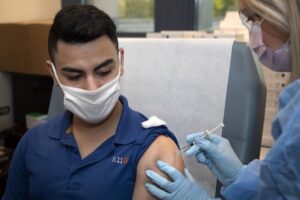
Story by Zeke Gonzalez
Walter Reed Army Institute of Research
On March 14, 2025, researchers from the Walter Reed Army Institute of Research met with Dr. Irene Soares, an associate professor at the University of São Paulo, to discuss a possible collaboration on “Vivaxin”, a candidate vaccine against Plasmodium vivax malaria. “Vivaxin” targets the malaria caused by the parasite Plasmodium vivax, a vaccine WRAIR is uniquely positioned to support in preclinical animal studies using P. vivax-infected mosquitos.
P. vivax is especially prevalent in Brazil, east African countries, and the Indo-Pacific. WRAIR has long been interested in the development of vaccines that can protect U.S. soldiers who are deployed to these areas.
WRAIR has contributed to the discovery and development of 100% of all Food and Drug Administration-approved malaria prevention drugs as well as the world’s most advanced malaria vaccine candidates, including the first vaccine approved by the World Health Organization: RTS,S. This vaccine targets the deadliest form of the malaria-causing parasite: Plasmodium falciparum.
“It’s safe to say that WRAIR has been working on a malaria vaccine since the very advent of the concept,” said Col. Paul Robben, the director of biologics research & development at WRAIR. “While RTS,S provides protection for populations who are challenged by malaria, it would not provide adequate protection for our service members because the U.S. is not a hotspot for malaria.”
Since our service members do not meet the criteria to use RTS,S, WRAIR instead encourages methods of malaria prevention to avoid infection in the first place: using mosquito nets, antimalarial drugs, insecticide, and other countermeasures. However, these prevention methods aren’t perfect.
“The problem is that prevention methods place a great burden on the warfighter,” explains Robben. “By requiring a soldier to perform these prevention tasks, it is an additional load on top of their required wartime actions.”
To address these challenges, according to Robben, WRAIR aims to alleviate these burdens by developing a vaccine that meets all the requirements to protect our soldiers from malaria.
Although WRAIR’s efforts have not yet yielded a malaria vaccine candidate that surpasses RTS,S, it remains equipped with the capabilities and experience to do so. “Since 1985, WRAIR has supported malaria clinical trials,” elaborated Dr. Campos-Chagas, the chief of WRAIR’s One Health-Vector Diagnostic Lab. “WRAIR uses a model that mimics the natural transmission of malaria bites to test possible vaccines. Our team at WRAIR headquarters and overseas at the Walter Reed Army Institute of Research-Armed Forces Institute of Medical Sciences have decades of experience producing infected mosquitos for use in clinical trials.”
Further, WRAIR’s Center for Infectious Disease has pathogen agnostic platforms that can be rigorously applied to the study of a malaria vaccine. “WRAIR is always open to potential collaborations like the University of São Paulo,” said Robben. “We remain ready to apply our capabilities and experience with collaborators who are prepared to develop a malaria vaccine that ensures the medical readiness of our soldiers.”
For more information on WRAIR’s efforts to combat vector-borne disease, visit our website https://wrair.health.mil/Biomedical-Research/Center-for-Infectious-Disease-Research/Entomology/